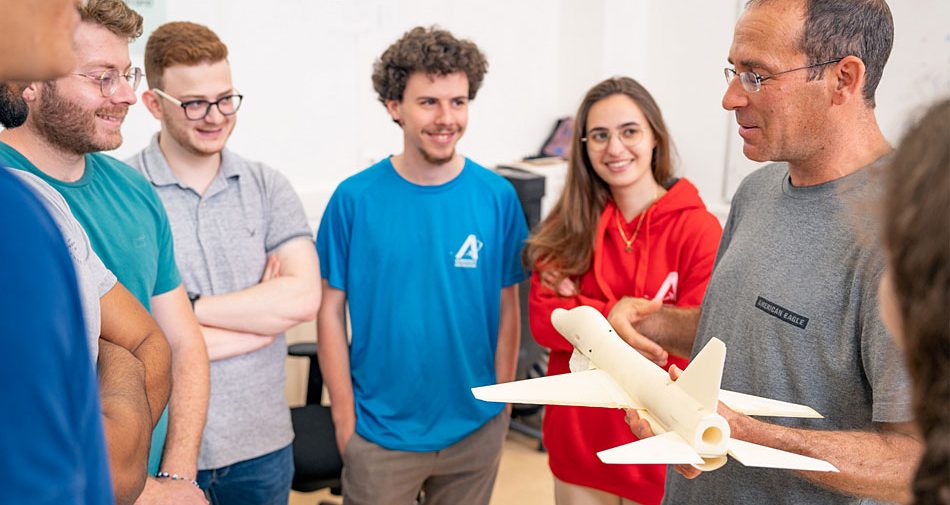
The faculty provides a four-year undergraduate study program that leads to a “Master of Science in Aerospace and Space Engineering” degree. We encourage those who wish to delve deeper into their studies, especially in the scientific domain, to pursue second (master’s) and doctoral degrees, with or without a thesis.

The AE department provides its students with the knowledge, tools, and the possibility to integrate into the most advanced fields of science, technology, and engineering. The wide variety of options open to aeronautics and space engineers allows them to choose the field in which they can express their interest and passion.
The first level, studied in the first three semesters, provides basic knowledge in the basic subjects: mathematics, physics, chemistry, and computer science.
The second tier includes mandatory faculty subjects. In the joint aero-physics engineering track, the compulsory subjects also include courses from the physics faculty’s curricula. In this layer, you get basic knowledge in each of the faculty’s basic areas of specialization.
In the third tier of the curriculum are the faculty elective subjects, in which one specializes in a more in-depth manner according to personal choice. In the last year of studies, the students carry out, according to their choice, a project in which a complex system is developed from the fields of aeronautics or space (plane, missile, satellite, etc.) In addition, the students participate in advanced laboratories and thereby acquire practical experience in their field.
The curriculum also includes 12 points of all-Technion elective subjects, of which 6 points are enrichment subjects (M.L.G. courses), 2 points are physical education subjects, and 4 points are subjects for the student to freely choose from among all the subjects offered at the Technion, subject to the registration rules for the subject.
Note: As our undergraduate studies are mostly in Hebrew. The PDF documents below are all in Hebrew. Please contact the Undergraduate Studies Coordinator, Ms. Dafna Hershko for further details.
Graduates of the major will receive a Bachelor of Science degree (B.Sc.) in Aerospace Engineering.
![]() Mandatory Courses (2024-2025)*
Mandatory Courses (2024-2025)*
(*) If a contradiction is found between the diagram and the catalog, the decisive information is the one in the catalog. In such a case, please inform the secretariat.
Electives in the curriculum
![]() Design and System Engineering
Design and System Engineering
![]() Mechanics of structures and materials
Mechanics of structures and materials
![]() Propulsion and Combustion
Propulsion and Combustion
![]() Guidance, Navigation, Control (GNC), and Autonomous Systems
Guidance, Navigation, Control (GNC), and Autonomous Systems
![]() Astronautics
Astronautics
![]() Aeronautics
Aeronautics
![]() Aerodynamics, and Aeroacoustics
Aerodynamics, and Aeroacoustics
For the aeronautics/astronautics major, you must choose at least 24 points in three of the seven clusters listed below, at least 8 points in each cluster. The rest of the required points can be chosen both from all the elective subjects of the faculty and from the list of elective subjects of other faculties. A subject taken as a core subject cannot be considered an elective subject.
![]() Elective subjects from other faculties
Elective subjects from other faculties
The scope of electives from other faculties shall not exceed 9 points.
![]() Graduation requirements (2023-2024)
Graduation requirements (2023-2024)
Graduates of the major will receive a certified degree in aeronautics and space engineering and physics (B.Sc.) in a double-major format.
![]() Aeronautics-Physics double course – Mandatory Courses (2024-2025)*
Aeronautics-Physics double course – Mandatory Courses (2024-2025)*
Electives:
Choose 22 or 21 points (depending on the core choice) from the clusters of your choice.
![]() Mechanics of structures and materials
Mechanics of structures and materials
![]() Propulsion and Combustion
Propulsion and Combustion
![]() Guidance, Navigation, Control (GNC), and Autonomous Systems
Guidance, Navigation, Control (GNC), and Autonomous Systems
![]() Astronautics
Astronautics
![]() Aeronautics
Aeronautics
![]() Aerodynamics, and Aeroacoustics
Aerodynamics, and Aeroacoustics
![]() Graduation requirements for students in the Aeronautics-Physics double course
Graduation requirements for students in the Aeronautics-Physics double course
A design project will be studied during the fourth year of studies for the whole year. At the end of each semester, the products are evaluated with the participation of judges from the field. You can choose between a project in the field of aeronautics or in the field of astronautics. Here are the necessary prerequisites for the projects:
Aeronautics design project
In the winter semester 084653 in the spring semester 084654
Prerequisites:
84143 Aerospace Systems Engineering and 84221 Flight Mechanics 2 and 84738 Control Theory and 85407 Propulsion – Jet Engines or 85406 Rocket Propulsion
Astronautics design project
In the winter semester 084651 in the spring semester 084652
Prerequisites:
84143 Aerospace Systems Engineering and 84738 Control Theory and 85915 Mechanics of Bodies in Space and 85406 Rocket Propulsion or 85920 Electric Propulsion for Space
Available only in the Hebrew section of this page
"*" indicates required fields